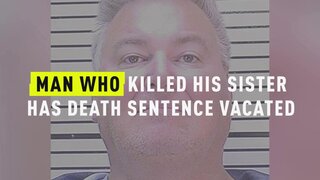Create a free profile to get unlimited access to exclusive videos, breaking news, sweepstakes, and more!
Man Who Brutally Murdered Sister And Brother-In-Law Over 'Liberal' Beliefs And 'Selfish' Acts Has Death Sentence Vacated
Edward Wycoff, who represented himself during the murder trial of his sister, Julie Rogers, and her husband, Paul Rogers, was likely mentally unfit to stand trial, according to a new Supreme Court ruling.

A California man who killed his sister and her husband then represented himself during his murder trial had his death sentence overturned by the state's Supreme Court this week.
Edward Wycoff had been on death row since 2009, following the brutal slaying of his sister, Julie Rogers, and his brother-in-law, Paul Rogers. On Aug. 23, however, California’s Supreme Court overturned his conviction, citing Wycoff’s possible mental incompetency.
In Jan. 31, 2006 pre-dawn attack, Wycoff, clad in black and wearing a motorcycle helmet, broke into his sister’s El Cerrito home and fatally attacked her and Paul Rogers with a knife and a wheelbarrow handle.
The couple’s two children found Paul Rogers face down in the home’s master bedroom, a knife protruding from his back. In his dying breaths, Paul Rogers pinpointed Wycoff as the murderer. Julie Rogers was found bleeding near a pool at the residence.
Wycoff, who vehemently denied having any mental health issues, clashed with his defense lawyers over his psychiatric condition ahead of the 2009 trial. A psychologist, who thrice evaluated Wycoff, declared him mentally incompetent. Nevertheless, he was allowed to represent himself. The court rejected the psychologist’s opinion and waived normal competency procedures in the trial.
Wycoff repeatedly confessed to murdering Julie and Paul Rogers in court and routinely taunted the couple’s surviving children in the courtroom. The Citrus Heights man portrayed his sister as “manipulative” and “selfish,” court documents state. He described Paul as a “communist” and “way over to the left.”
According to court documents, Wycoff said he carried out his sister and brother-in-law’s killing because they were “liberal,” and “evil people.” He said that killing them would make the world a better place.
“It had to be done,” Wycoff said. “But, you know, it is something to celebrate when you get some awful person that is ruining people’s lives... and you make a correction like that.”
Wycoff opted to not use a gun as a murder weapon because he hypothesized the double slaying could be “‘another statistic that liberals could use’ to argue in favor of gun control,” court documents stated.
At the time of the slayings, Wycoff was also angry at his sister and her husband over the division of his father’s estate.
Wycoff was later found guilty on both counts of first-degree murder. He was sentenced to death.
In Monday’s ruling, which was obtained by Oxygen.com, Justice Martin J. Jenkins concluded that Wycoff’s mental state prevented him from consulting with his counsel "with a reasonable degree of rational understanding."
“The judgment is reversed in its entirety,” Jenkins wrote in his decision.
Jenkins acknowledged Wycoff was “manifestly aware” of the trial proceedings and demonstrated a “high degree of sophistication.” However, he ultimately ruled that the trial court faltered by not addressing and treating the defendant’s competency, as required by California penal codes 1368 and 1369.
“When a doubt as to a defendant’s mental competence arises, the trial court shall ‘inquire of the attorney for the defendant whether, in the opinion of the attorney, the defendant is mentally competent,’” Jenkins added. “In some cases, defense counsel might not agree that the defendant is mentally incompetent; here, however, the court did not make the inquiry. By not initiating a competency proceeding by making that inquiry, the trial court erred.”
The ruling paves the way for a potential new trial in Contra County Superior Court, pending a new psychological evaluation of Wycoff. If declared competent, Wycoff could opt for self-representation again.
“Defendant may be retried if the trial court concludes, at the time of such retrial, that he is mentally competent,” Jenkins added. “If defendant again seeks to represent himself, the trial court has discretion, depending on the medical evidence, to deny self-representation.”
It’s unclear if Wycoff will be retried. Scott Alonso, a public information officer for the Contra Costa County District Attorney’s Office, told Oxygen.com on Wednesday that they are reviewing the court’s decision and as of now have no further comment.
Wycoff said prior to killing Julie and Paul Rogers, he climbed to the top of a hill near the Mojave Desert. He prayed and said he later received a “sign from God to kill” the couple.
Investigators later seized handwritten poetry from Wycoff’s cell, which described the murders in graphic detail. During jailhouse calls, Wycoff apparently also admitted he often daydreamed about mass murder.
“I’m just one trait away from being a real serial killer that just kills people for the fun of it,” Wycoff concluded during a recorded conversation.
Wycoff was also fascinated with serial killer Ted Bundy and domestic terrorist Ted Kaczynski, according to court documents. He wrote of his love of explosives and sprinkled jailhouse writings with the phrase “redrum” — which is "murder" spelled backward and a plot element to Stephen King’s horror novel, “The Shining.”
Wycoff is currently being housed on death row at San Quentin. He’ll remain in custody during any re-trial or until his sentence is vacated, according to corrections officials.
























